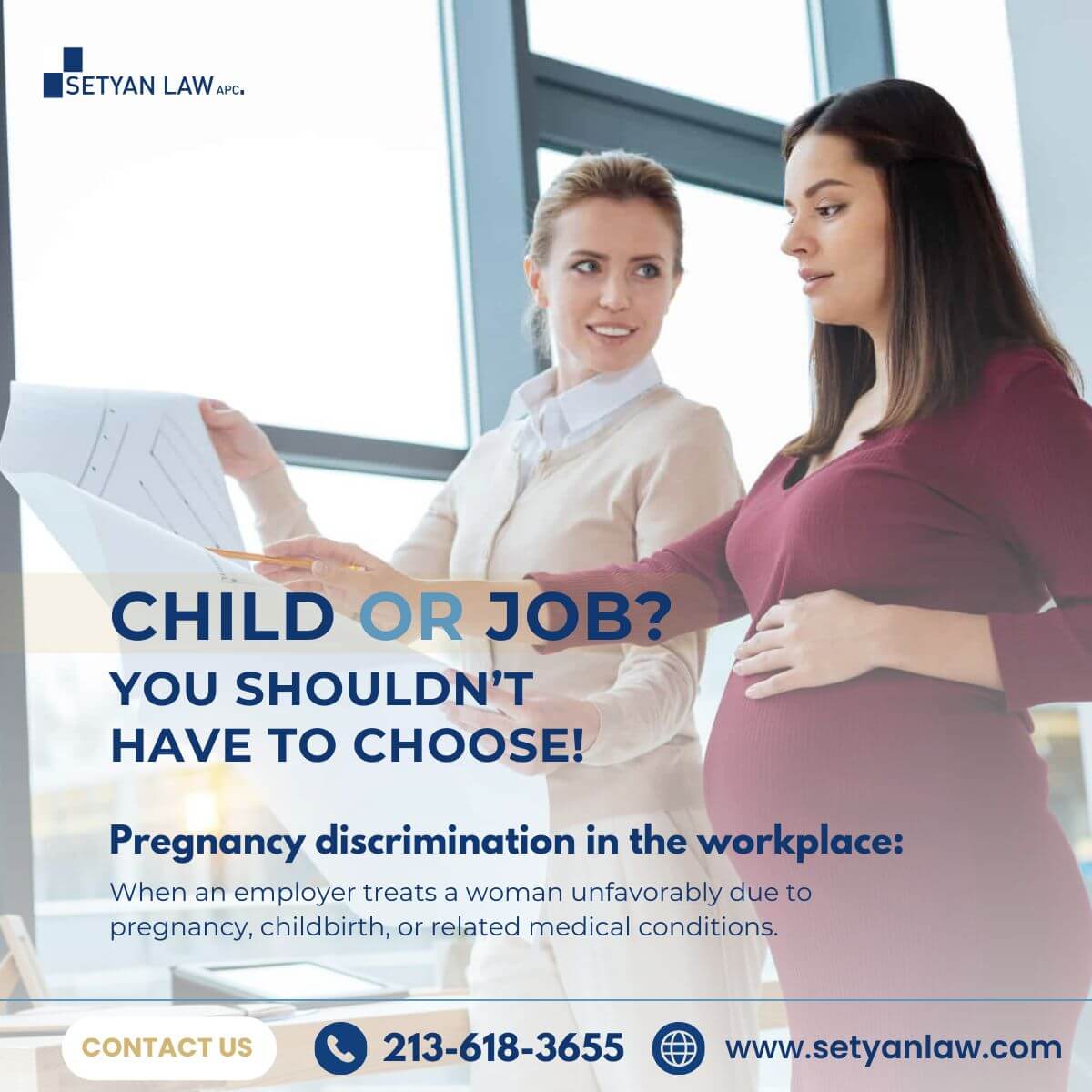Updated March 25, 2025
Pregnancy Discrimination in The Workplace: Often Unreported
In today’s society, workplace discrimination remains a persistent issue, particularly when it comes to pregnancy discrimination. The push to curb this illegal act is part of the broader struggle to protect women’s rights overall.
Despite the existence of laws and regulations, many women continue to face bias and unfair treatment in the workplace, hindering their professional growth and well-being. Unveiling the concealed reality of pregnancy discrimination and exploring its various forms, implications, and potential solutions is critical. By addressing the challenges faced by pregnant employees, we can work towards creating a more inclusive and equitable work environment for all.
Understanding Pregnancy Discrimination
The Pregnancy Discrimination Act: An Overview
The federal government has taken steps to protect pregnant employees through the Pregnancy Discrimination Act (PDA). Enacted over 40 years ago, this law prohibits discrimination against women based on pregnancy, childbirth, or related medical conditions. It aims to ensure that pregnant individuals are not treated unfavorably or denied employment opportunities due to their pregnancy status.
California: Leading the Way in Pregnancy Protection
In addition to federal legislation, California has implemented its own state laws to further safeguard the rights of pregnant women in the workplace. These laws provide broader protections and reinforce the importance of supporting pregnant employees throughout their journey.
The Burden of Unreported Cases
Despite the existence of legal protections, many cases of pregnancy discrimination go unreported. This lack of reporting can be attributed to various factors, including fear of retaliation, limited knowledge of rights, and concerns about career advancement.
A recent survey of mothers revealed startling numbers. Well over half indicated they were victims of harrassment and/or discrimination in their workplace. Even worse, nearly a fifth of them left their jobs as a result. Furthermore, when comparing the pregnancy discrimination claims filed with the Equal Employment Opportunity Commission (EEOC) with the totals, there is a substantial discrepency. Out of approximately 73,000 discrimination claims total, only 7,000 were pregnancy cases.
This mismatch points towards an unfortunate reality with workplace discrimination: illegal acts of pregnancy discrimination in the workplace are not just underreported, but chronically underreported.
“[We] surveyed more than 24,000 mothers, revealing that almost a fifth (19%) had left their employer due to a negative experience related to their maternity. The research also found that 74% of women had received comments that their performance had dipped due to pregnancy or maternity leave. Almost two-thirds (64%) of pregnant women said their boss or colleagues had made hurtful comments about the way they looked. One in 10 said they were bullied or harassed when pregnant or returning to work..” – Pregnant then Screwed
It is crucial to acknowledge the prevalence of unreported cases and work towards creating a safe and supportive environment for pregnant employees to come forward.
The Impact of Pregnancy Discrimination
Stereotypes and Bias in the Workplace
Stereotypes and bias play a significant role in perpetuating pregnancy discrimination. Women often face discriminatory comments and assumptions, such as being too emotional to work effectively or being unable to handle physically demanding tasks. These stereotypes not only undermine the capabilities of pregnant employees but also hinder their career progression.
The Motherhood Penalty
One of the most significant consequences of pregnancy discrimination is the motherhood penalty. Women who become mothers often experience setbacks in their careers, including reduced opportunities for advancement, lower salaries, and limited access to flexible work arrangements. This penalty exacerbates gender inequality in the workplace and hinders the achievement of true gender parity.
Overt and Covert Discrimination
Pregnancy discrimination can manifest in both overt and covert ways. While some instances of discrimination are blatant and unmistakable, others are more subtle, making it challenging to identify and address. It is essential to recognize and address both overt and covert forms of discrimination to ensure a fair and inclusive work environment.
Overcoming Pregnancy Discrimination
Raising Awareness and Education
Raising awareness about pregnancy discrimination is vital in combating this issue. Educating both employers and employees about the rights and protections afforded to pregnant individuals can help create a culture of inclusivity and support. Workshops, training sessions, and informational campaigns can play a crucial role in promoting awareness and understanding.
Implementing Strong Policies and Practices
Organizations must establish robust policies and practices that explicitly address pregnancy discrimination. This includes implementing clear anti-discrimination policies, providing reasonable accommodations for pregnant employees, and fostering a supportive and inclusive work environment. By prioritizing the well-being of pregnant employees, organizations can create a culture that values diversity and equality.
Empowering Pregnant Employees
Empowering pregnant employees to assert their rights and report instances of discrimination is crucial. Providing resources and support networks can help individuals navigate the challenges they may face during pregnancy. Additionally, establishing channels for confidential reporting and offering pregnancy discrimination legal help can further encourage individuals to come forward and seek justice.
Conclusion
Pregnancy discrimination remains a pervasive issue that requires proactive measures to be addressed effectively. By acknowledging the hidden reality of pregnancy discrimination, we can work towards creating a more inclusive and equitable work environment for all employees. Through increased awareness, strong policies, and empowerment, we can dismantle the barriers that pregnant individuals face and strive towards equality in the workplace. Let us collectively commit to ending pregnancy discrimination.
Call Setyan Law at (213)-618-3655 for a free consultation.






